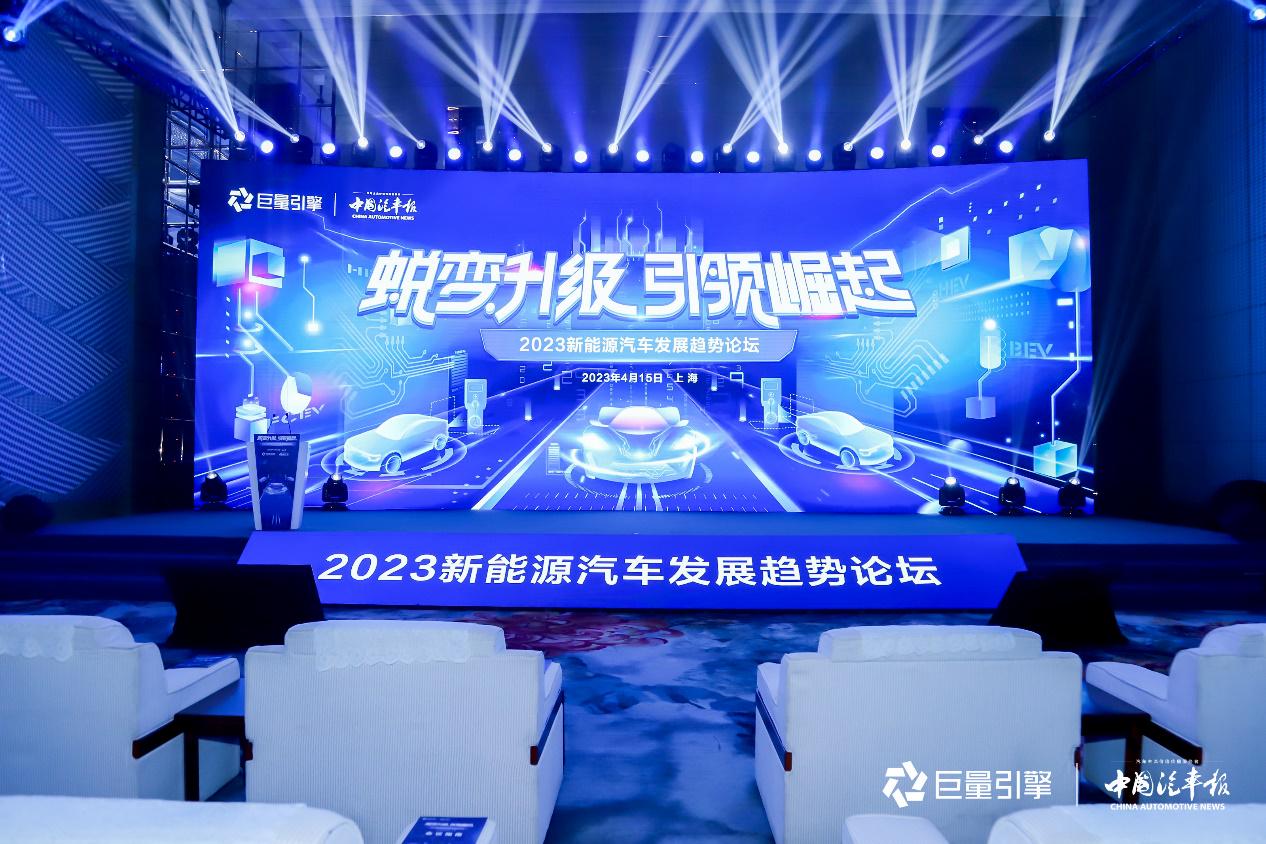The Trend Forum of New Energy Vehicles was successfully held on April 15, 2023. With the theme of “Transformation and Upgrade, Leading the Rise”, this forum focused on the core issues of the development trend of China’s new energy vehicle industry, helping Chinese automobile brands move upward, and low-carbon transformation and upgrading of the industry. Experts from the government, industry, and enterprises gathered together to conduct in-depth discussions.
The Development of New Energy Vehicles is Irresistible
Zhang Jianxing, former president of People’s Daily and chairman of China Newspaper Association, pointed out that 2023 is a crucial year to achieve the goal of the “14th Five-Year Plan”. We must firmly grasp the “high-quality development” as the top priority. The high-speed development of new energy vehicles has become a shining “business card” of China, playing a key role in promoting the green, low-carbon, and sustainable development of China’s automobile industry, becoming the core competitiveness of China’s automobile industry transformation and upgrading.
China’s new energy vehicles have gained a first-mover advantage with an unexpected growth rate, entering a fast lane of development, but there are still shortcomings in stable and reliable industrial chains, core technology breakthroughs, enterprise profitability, and integration in multiple fields.
In this regard, Xin Ning, President of China Automotive News, believes that China’s new energy vehicle industry faces a complex situation of opportunities and challenges, advantages and disadvantages, competition and cooperation. To achieve the upward development of China’s automobile brands through the vigorous development of new energy vehicles, we need to start with the following three points: First, start with the nine core connections of production relations, environmental relations, industrial relations, value relations, humanistic relations, data relations, policy standards and regulations relations, user relations, and business relations to achieve digital transformation; Secondly, start with the consumption concept and decision-making trends, consumption upgrade trends, endogenous consumption trends, changes in consumption awareness trends, and diversified consumption scenarios to conduct research on the development of new energy vehicles. Third, under the background of the dual-carbon target, understand the changes in automotive product forms and marketing models.
Yuan Chengyin, general manager of National New Energy Vehicle Technology Innovation Center and secretary-general of China Automotive Chip Industry Innovation Strategic Alliance, also pointed out that the new energy vehicle industry still faces certain difficulties in areas such as electronic and electrical intelligentization, digital capacity building, and core technology, especially in the fields of self-developed automotive chips, software digitalization, energy storage, and talent system. Only by strengthening cooperation upstream and downstream of the industry chain and forming an innovation ecosystem can we solve the problem of “how to make products with higher quality, more technical content, and more customer satisfaction”.
In addition, there are significant challenges in exporting cars. Bai Ming, a foreign trade expert of the Commerce Ministry’s Advisory Committee on Trade Policy and a member of the degree committee of the Commerce Ministry’s Research Institute, said that China’s foreign trade is “getting through” this year, but according to the latest data released by the World Trade Organization (WTO), the latest reading of the goods trade barometer is 92.2, which has declined significantly. It can be seen that China is currently facing a significant external trade environment.
Against this backdrop, Zhang Wei, a digital trade consultant to the government, chief expert of the China Service Trade Association, and former vice chairman of the China International Trade Promotion Committee, pointed out that companies are facing dual pressures of serious domestic demand shortages, unbalanced foreign trade structures, intensified international market competition, and geopolitical conflicts. Domestic companies also face serious bottleneck issues in critical technology.
In this regard, Zhang Wei believes that a resilient and open automotive supply chain should be established: the first is to focus on the construction of a more open system, focusing on the use and changes of tariff rules; the second is to pay attention to geopolitical changes; the third is to focus on upgrading the value chain; the fourth is to pay attention to the diverse changes in commercial forms; the fifth is to focus on AI platforms, focusing on cost savings and efficiency boosts; and the sixth is to focus on digital transformation, focusing on critical technology of digital foundation.
At the roundtable discussion, assistant secretary-general and Minister of Technology of the China Association of Automobile Makers, Wang Yao, Executive Director and Editor-in-Chief of China Automotive News, Gui Junsong, Professor of the School of Vehicle and Mobility of Tsinghua University, Song Jian, Director of China Automotive Engineering Research Institute Co., Ltd., Chao Peipei, Deputy Director of the China Automotive Strategic and Policy Research Center of China Automotive Technology and Research Center, and Executive Deputy Director of the China Automotive Strategic and Policy Research Center of China Automotive Technology and Research Center, Xu Yaozong, and Li Pan, Vice General Manager of Public Relations of Changan Automobile Brand, held in-depth discussions on “how new energy vehicles can support the upward trajectory of Chinese auto brands.”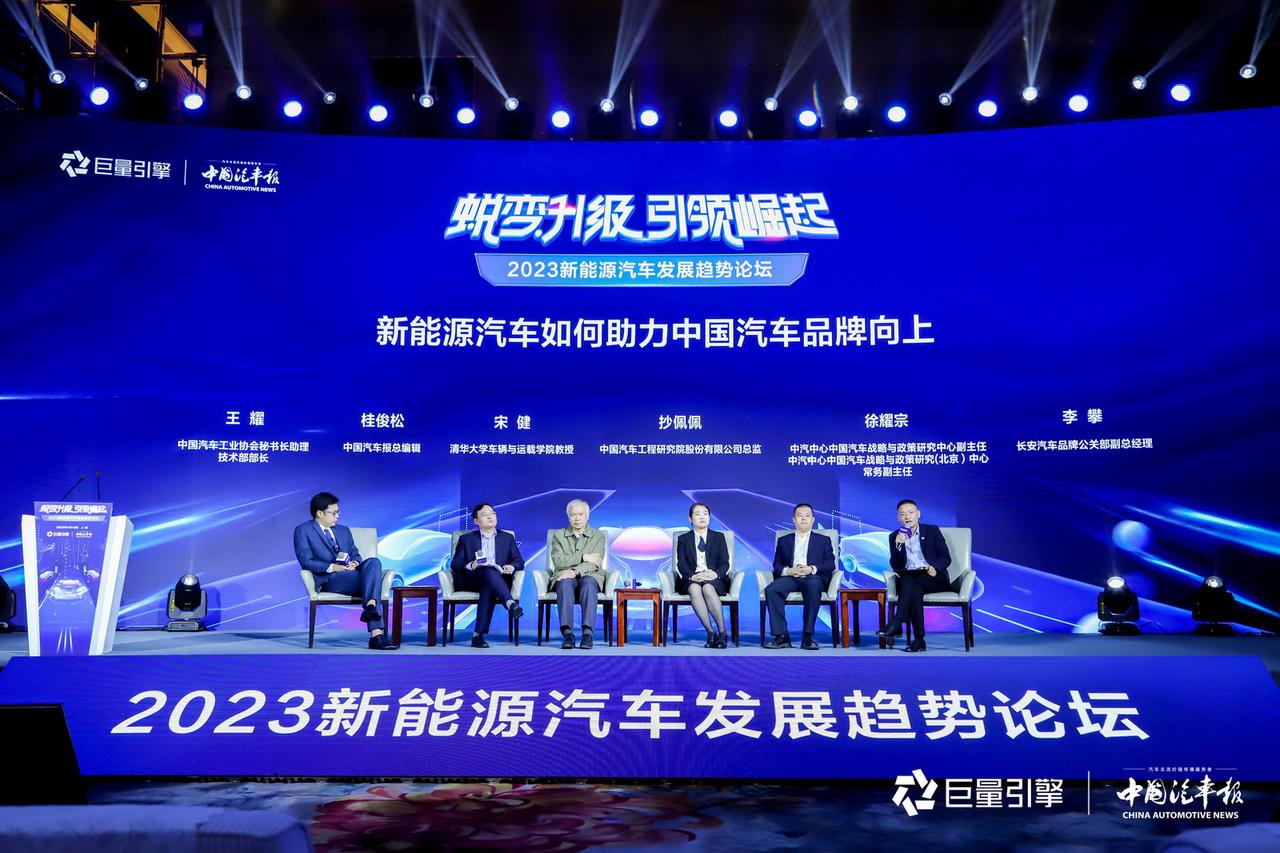
Digitizing Marketing: The Way for Car Enterprises to Break through
The rise of new energy vehicles indicates that the automotive industry is undergoing a revolutionary change. The shift from “product is king” to “customer is king” thinking has made the marketing process that connects directly with users even more critical. According to Bai Lijun, General Manager of the Vertical Business of the Huge Amount Engine in the automotive industry, in the rapidly changing new energy vehicle market, product, user, and marketing are all changing. Douyin has become a key platform for supporting the development of new energy vehicle brands. In the first quarter of this year, the number of Douyin users interested in new energy vehicles increased by 46.5% compared with the same period last year. In terms of content, the proportion of car purchasing content is gradually increasing, showing that Douyin users are more concerned about new energy vehicle selection, evaluation, and other related content.
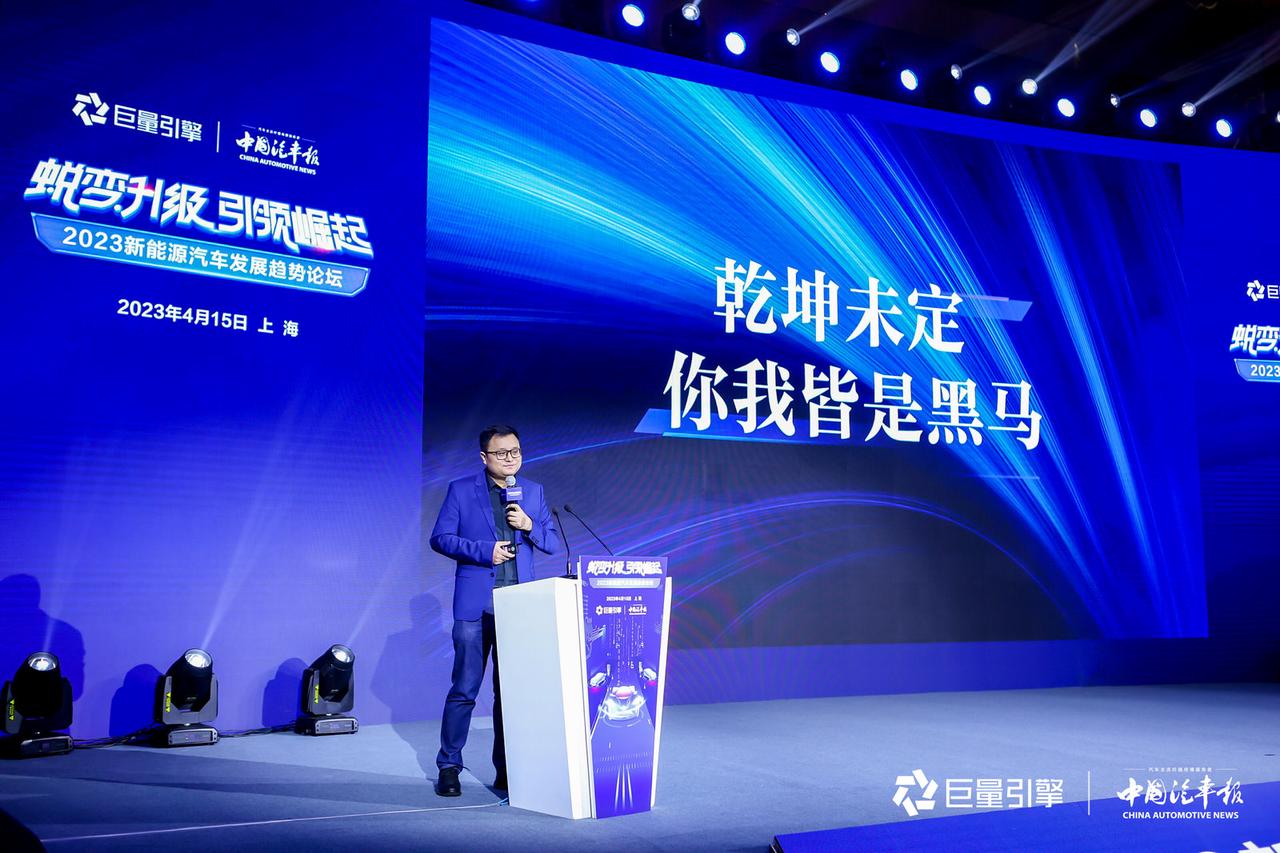
In the new marketing system, Huge Amount Engine proposes a marketing solution for the automotive industry from the perspective of “marketing + operation” integration. Through the powerful user traffic of Douyin, it helps car companies win the brand battle, data battle, and product battle in the automotive industry in the new era. In the new marketing environment, two key things must be done: “business-type seeding operation” and “digital lead management” to enhance the brand’s strength. Among them, for brand seeding, it is important to have good “content, promotion, and measurement”; for lead generation, using the “synergy of advertising traffic and natural traffic” will help car companies reduce costs and increase efficiency.
Qin Lihong, co-founder and president of NIO, shared the company’s experience in expanding overseas markets. He believes that globalisation is inevitable for the industry and not a subjective strategic choice of enterprises. Qin Lihong emphasised that under the inevitability of globalisation, during the significant opportunities of the century-old revolution in the automotive industry, and the information and intelligent technology revolution, based on the abundant economic achievements of our country, companies must set the goal of creating a global enterprise and brand. Of course, Chinese car companies must understand that globalisation presents significant challenges. Therefore, they must “maintain long-termism, strategic determination and sufficient patience and promote the process of Chinese brands going global with a win-win attitude”.
 For the topic of “How can car companies break through and grow in the era of digital marketing,” Wu Weiqiang, founder of Shuidi Car, Guo Tong, Chief Brand Officer of Deep Blue Car, Liu Chen, General Manager of User Development Center of Feifan Car, Zhang Yaodong, founder of Xingchechang, Zhu Feng, Head of Vertical Business Marketing Strategy Center of Juzheng Engine, and Tang Hongxu, Head of Vertical Business Operations of Industry Marketing of Juzheng Engine, also had a heated discussion during the roundtable forum.
For the topic of “How can car companies break through and grow in the era of digital marketing,” Wu Weiqiang, founder of Shuidi Car, Guo Tong, Chief Brand Officer of Deep Blue Car, Liu Chen, General Manager of User Development Center of Feifan Car, Zhang Yaodong, founder of Xingchechang, Zhu Feng, Head of Vertical Business Marketing Strategy Center of Juzheng Engine, and Tang Hongxu, Head of Vertical Business Operations of Industry Marketing of Juzheng Engine, also had a heated discussion during the roundtable forum.
Among them, Tang Hongxu emphasized that the automotive industry, as a lead generation track, is shifting from lead generation to lead management. How to do a good job in lead business becomes the key to the success of vehicle manufacturers and dealers in operating and marketing.
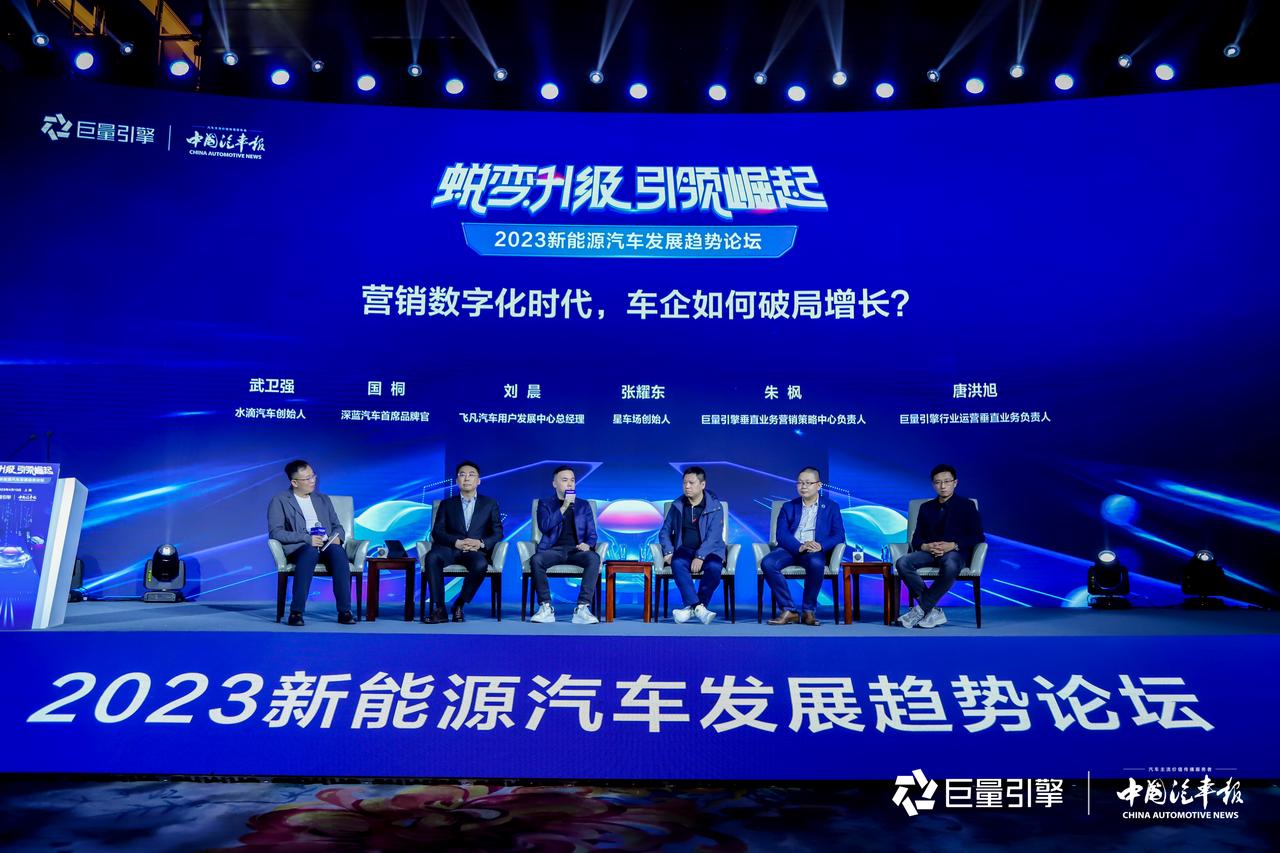
At the forum, Juzheng Engine and China Automobile Dealers Association jointly produced the “Juzheng Engine Automotive Industry One-Stop Business White Paper,” which is dedicated to using scientific strategies to help vehicle manufacturers complete business innovation and empower brand marketing in the new era.
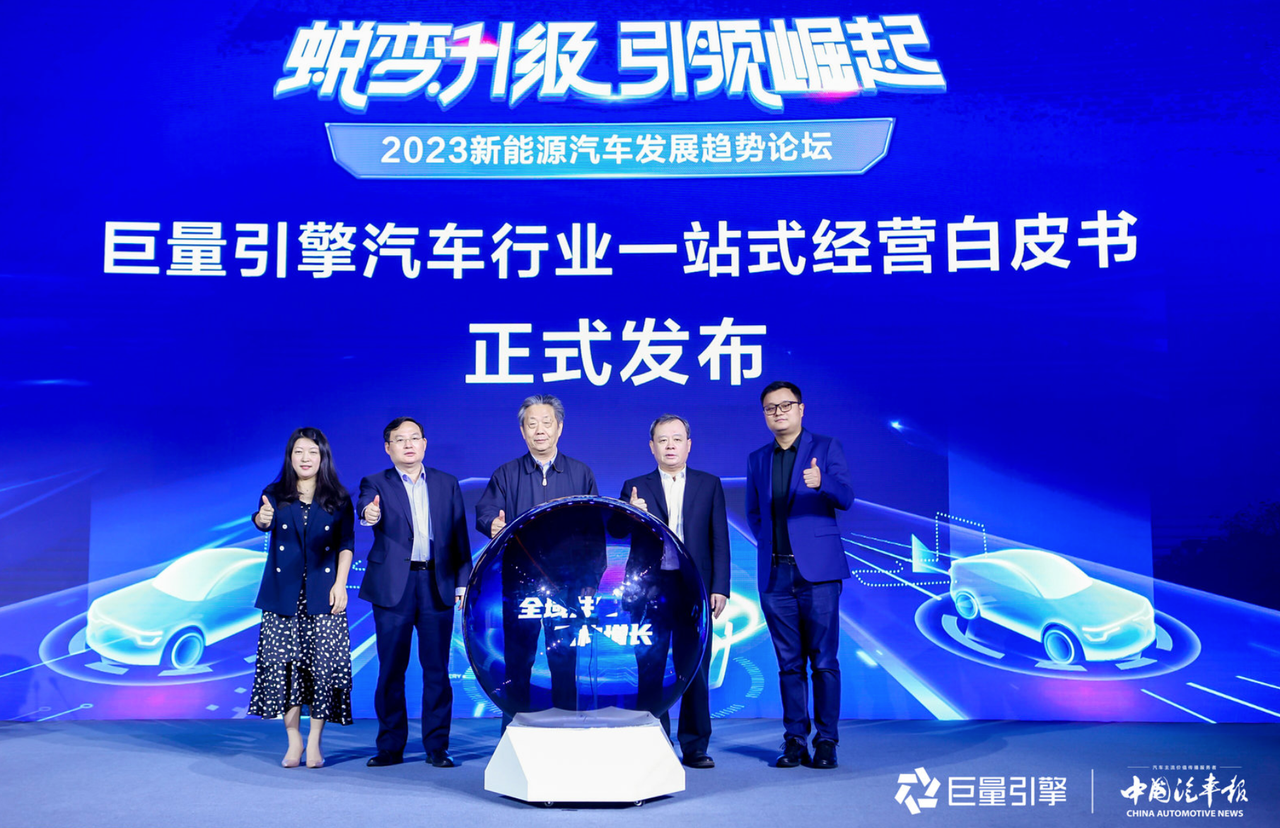
Coinciding with the opening of the 20th Shanghai International Automobile Industry Exhibition, the convening of the 2023 New Energy Vehicle Development Trends Forum not only explores the direction of new energy vehicle companies’ development but also helps more new era vehicle companies to start “one-stop business integration of marketing and operation,” creating a new chapter of growth.
This article is a translation by ChatGPT of a Chinese report from 42HOW. If you have any questions about it, please email bd@42how.com.
